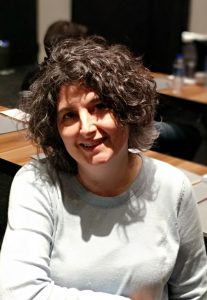BY AFSHAN NABI (MBG/IV)

Assoc. Prof. Özlen Konu graduated from Middle East Technical University (METU) in 1987 with a BS degree in biological sciences. She completed her graduate studies at Texas Tech University, receiving her MS and PhD degrees in 1992 and 1999, respectively, and was a postdoctoral research fellow at the University of Tennessee at Memphis during the period 2000–2002. Since September 2002 she has been a faculty member in the Bilkent University Department of Molecular Biology and Genetics. Dr. Konu’s research focuses primarily on comparative gene expression analysis and cancer signaling between mammals and zebrafish.
Why did you become a scientist?
I became interested in ecology and animal behavior during my undergraduate studies at METU. I pursued this interest further during my graduate studies at Texas Tech, where I wrote my master’s thesis on the foraging behavior of freshwater snails. During this study, I learned about quantitative biology, which I later used for the construction of developmental models in zebrafish. I eventually began to use this expertise for the application of large-scale molecular data in dealing with human diseases such as cancer.
Please explain your current research for our readers.
Currently my lab focuses on deciphering the role of molecules such as nicotine and salt and their receptors in the development and progression of cancer. We use different approaches that range from molecular modifications in cancer cell lines to zebrafish models and bioinformatics. In addition, we are interested in comparing the sequence and expression of genes between mammals and fish to understand how similarly genes with roles in cancer are modulated in different species; this helps us understand a gene’s functional conservation and association with disease.
Why is your research important?
The zebrafish, a small tropical species, has eyes as we do, has fins as we have arms and legs, and can even develop cancers with similar characteristics to those found in humans. This is because the human genome is highly homologous with the zebrafish genome, such that proteins of both species are similar in sequence/structure and thus may act similarly. If we understand how a zebrafish gene works, this can lead to an understanding of how the homologous corresponding human gene with an unknown function works; and this functional discovery can be critical for human health and fitness.
What is one bit of science from your field that you think everyone should know?
There are only a limited number of genes coding for proteins in any genome; however, the number of potential interactions among these proteins is much greater than the gene number itself, and this is what makes biological systems complex and dynamic.
What distracts you?
The universe of ideas.
Any advice for students starting their careers?
My studies over the years have taught me how invaluable doing interdisciplinary work is for a better understanding of biological phenomena, whether that work is ecological, developmental or medicinal. I believe this may be true for any profession.
